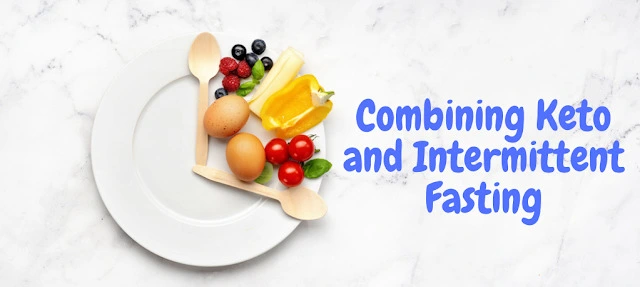We know that navigating the world of diets and weight loss can be overwhelming, so we want to break down the benefits of these two popular methods and how they can work together to help you achieve your weight loss goals.
First, let’s start with a brief explanation of the keto diet and intermittent fasting. The keto diet, also known as the ketogenic diet, is a low-carb, high-fat diet that puts your body into a state of ketosis, where it burns fat for energy instead of carbohydrates. Intermittent fasting, on the other hand, is an eating pattern involving alternating eating and fasting periods.
So, why combine the two? Well, research suggests that the keto diet can help to increase fat burning and weight loss, while intermittent fasting has been shown to boost metabolism and improve insulin sensitivity.
You can experience even more excellent weight loss results by combining the two. The body is in a state of ketosis, where it burns fat for energy and fasting, which helps burn fats. It can be a powerful combination for weight loss.
Of course, it’s important to remember that every person is unique, and what works for one person may not work for another. Before making any changes to your diet or exercise routine, we recommend consulting a healthcare professional. But, if you’re looking for a new weight loss strategy, the keto diet and intermittent fasting combination are worth considering.
How the Keto Diet Works
The keto diet, also known as the ketogenic diet, is a low-carb, high-fat diet that has recently gained popularity as a weight loss method.
But how exactly does it work? The principles of the keto diet are simple: by drastically reducing your intake of carbohydrates, your body is forced to turn to fat as its primary fuel source.
When you eat carbohydrates, your body converts them into glucose, which is used for energy. However, when you restrict your carbohydrate intake, your body’s glucose levels drop, and it starts to produce molecules called ketones, which are made from the breakdown of fat in the liver. Then, you can use these ketones for energy instead of glucose.
This state of burning ketones for energy instead of glucose is called ketosis. When the body is in a state of ketosis, it becomes much more efficient at burning fat for energy, which can lead to weight loss. Additionally, the keto diet promotes weight loss by reducing hunger and increasing feelings of fullness, making it easier to stick to a calorie-controlled diet.
The role of ketones in weight loss
Now, let’s talk about the role of ketones in weight loss. As mentioned earlier, when the body is in a state of ketosis, it’s burning fat for energy instead of carbohydrates. When you burn fat, you’re also losing weight. Additionally, the body uses stored fat as energy, which can lead to weight loss.
It’s worth noting that the keto diet isn’t for everyone, and it’s essential to consult a healthcare professional before making any significant changes to your diet. However, the keto diet can be a practical option for those seeking a new weight loss strategy. By drastically reducing your carbohydrate intake, your body enters a state of ketosis, which burns fat for energy, leading to weight loss.
The keto diet is a low-carb, high-fat diet that aims to put the body into a state of ketosis, where it burns fat for energy instead of carbohydrates. It can lead to weight loss. The keto diet also promotes weight loss by reducing hunger and increasing feelings of fullness. Consult your healthcare professional before making any significant changes to your diet.
How Intermittent Fasting Works
Intermittent fasting is an eating pattern that involves alternating periods of eating and fasting. It’s a simple concept that has significantly impacted weight loss and overall health. The principles of intermittent fasting are easy to understand: during the fasting period, you’re not allowed to consume any calories, while during the eating period, you can eat as you usually would.
There are a few different types of intermittent fasting methods, such as the 16/8 method, where you fast for 16 hours and eat during an 8-hour window, or the 5:2 method, where you usually eat for five days and restrict your calorie intake for two non-consecutive days. The key is to find a plan that works for you and your lifestyle.
The role of hormones in weight loss
Intermittent fasting has been shown to boost metabolism, improve insulin sensitivity and increase the release of growth hormones. These hormones play a critical role in weight loss. Growth hormone, for example, helps to increase muscle mass, which in turn helps to boost metabolism and burn more calories. Insulin sensitivity, on the other hand, helps to regulate blood sugar levels, which can prevent the accumulation of body fat.
Intermittent fasting can also reduce hormone ghrelin levels, often referred to as the “hunger hormone.” Ghrelin is responsible for stimulating appetite, so when levels are reduced, it can help to reduce feelings of hunger and make it easier to stick to a calorie-controlled diet.
It’s worth noting that intermittent fasting is not for everyone, and you must consult a healthcare professional before making any significant changes to your diet or exercise routine. However, intermittent fasting can be a practical option for those seeking a new weight loss strategy.
By alternating periods of eating and fasting, it can boost metabolism, improve insulin sensitivity and reduce the hunger hormone, leading to weight loss.
Intermittent fasting is an eating pattern that involves alternating periods of eating and fasting. It can boost metabolism, improve insulin sensitivity and increase the release of growth hormone, which plays a critical role in weight loss.
Additionally, it can reduce the hunger hormone ghrelin levels, making it easier to stick to a calorie-controlled diet. Consult your healthcare professional before significantly changing your diet or exercise routine.
Combining Keto and Intermittent Fasting
The keto diet and intermittent fasting are two popular weight loss methods, and when combined, they can complement each other in powerful ways.
The keto diet is a low-carb, high-fat diet that puts your body into a state of ketosis, where it burns fat for energy instead of carbohydrates. Intermittent fasting, on the other hand, is an eating pattern involving alternating eating and fasting periods.
When combined, the keto diet provides the body with the necessary macronutrients to fuel the body during the fasting period, while intermittent fasting amplifies the fat-burning effects of the keto diet by increasing insulin sensitivity and growth hormone levels.
Potential benefits of combining the two for weight loss
One of the potential benefits of combining the two is that it can lead to even more excellent weight loss results. As the body is in a state of ketosis, it’s already burning fat for energy. Adding intermittent fasting to the mix amplifies the fat-burning effects, which can lead to a more significant weight loss.
Another potential benefit is that it can reduce feelings of hunger and make it easier to stick to a calorie-controlled diet. The keto diet promotes feelings of fullness, and intermittent fasting can reduce the hunger hormone ghrelin levels, making it easier to stick to the diet.
The keto diet and intermittent fasting may only be for some. You must consult a healthcare professional before significantly changing your diet or exercise routine.
However, for those looking for a new weight loss strategy, the keto diet and intermittent fasting combination can be a practical option. By combining the two, you can experience even more excellent weight loss results and make it easier to stick to the diet.
Keto and intermittent fasting complement each other by providing the body with the necessary macronutrients to fuel the body during the fasting period while amplifying the fat-burning effects of the keto diet.
This combination can lead to even more excellent weight loss results and make it easier to stick to a calorie-controlled diet. Consult your healthcare professional before significantly changing your diet or exercise routine.
Tips for Successfully Implementing the Keto-Intermittent Fasting Combo
If you’re interested in trying the keto diet and intermittent fasting combination, it’s essential to be prepared and have a plan in place. Here are some tips to help you successfully implement the combo and achieve your weight loss goals.
Meal planning and preparation tips
First and foremost, meal planning and preparation are essential. Regarding the keto diet, it’s crucial to understand which foods are allowed and which are off-limits. Make sure to stock your kitchen with keto-friendly foods and plan your meals. It will make it easier to stick to the diet and ensure you get the right macronutrients to fuel your body during fasting.
It’s also a good idea to have healthy keto-friendly snacks, such as nuts, seeds, and hard-boiled eggs, to help curb hunger during fasting.
Tips for sticking to the diet
Another tip for sticking to the diet is to be consistent with your eating schedule. Intermittent fasting works best when you’re compatible with your fasting and eating periods. Try to stick to the same plan daily, and avoid snacking during fasting.
Another tip is to find a workout routine that works for you and stick to it. Regular exercise can help boost weight loss, and it’s an integral part of a healthy lifestyle.
In summary, combining the keto diet and Intermittent fasting is a powerful tool for weight loss. The keto diet helps the body to burn fat for energy, and intermittent fasting boosts metabolism and improves insulin sensitivity. It can lead to a more significant weight loss result. Consult your healthcare professional before starting any new diet or exercise regimen.
Lastly, don’t be too hard on yourself. Don’t beat yourself up if you slip up and eat something that’s not allowed on the keto diet. Just get back on track with your next meal. Remember, weight loss is a journey that will not always be perfect.
Remember, weight loss is a journey that will not always be perfect.












